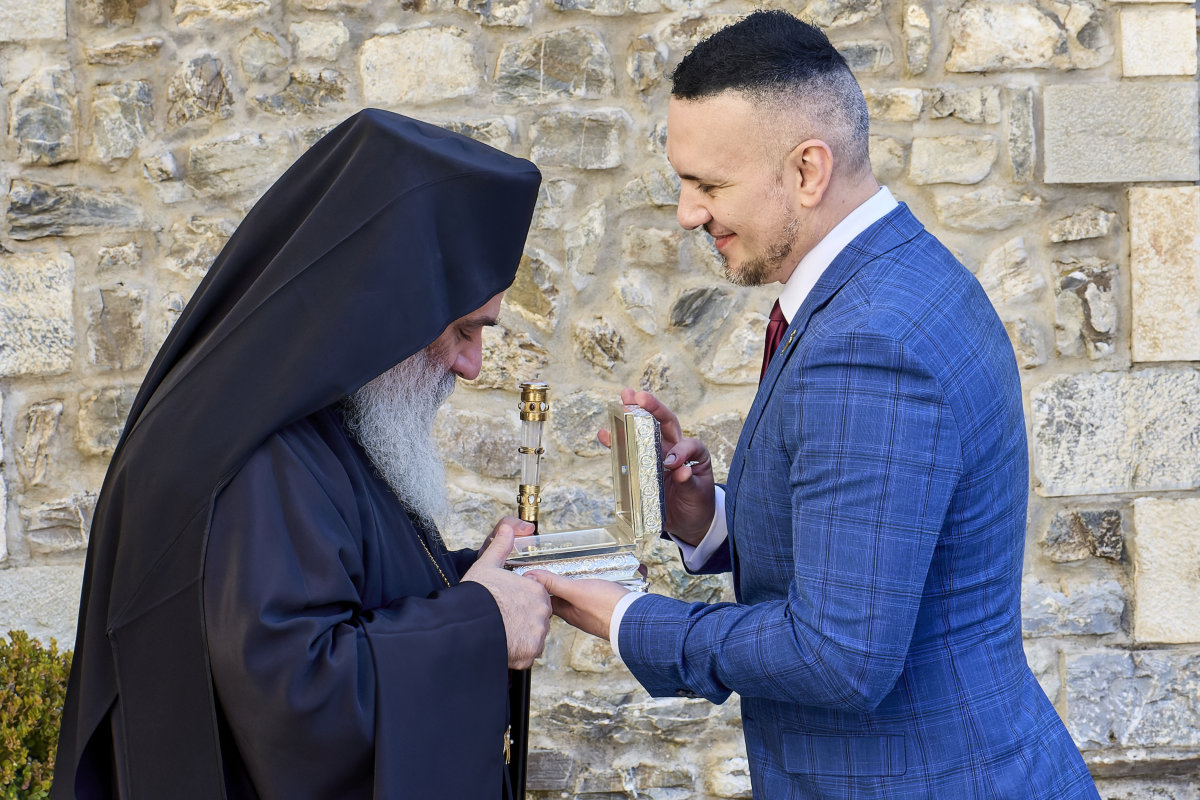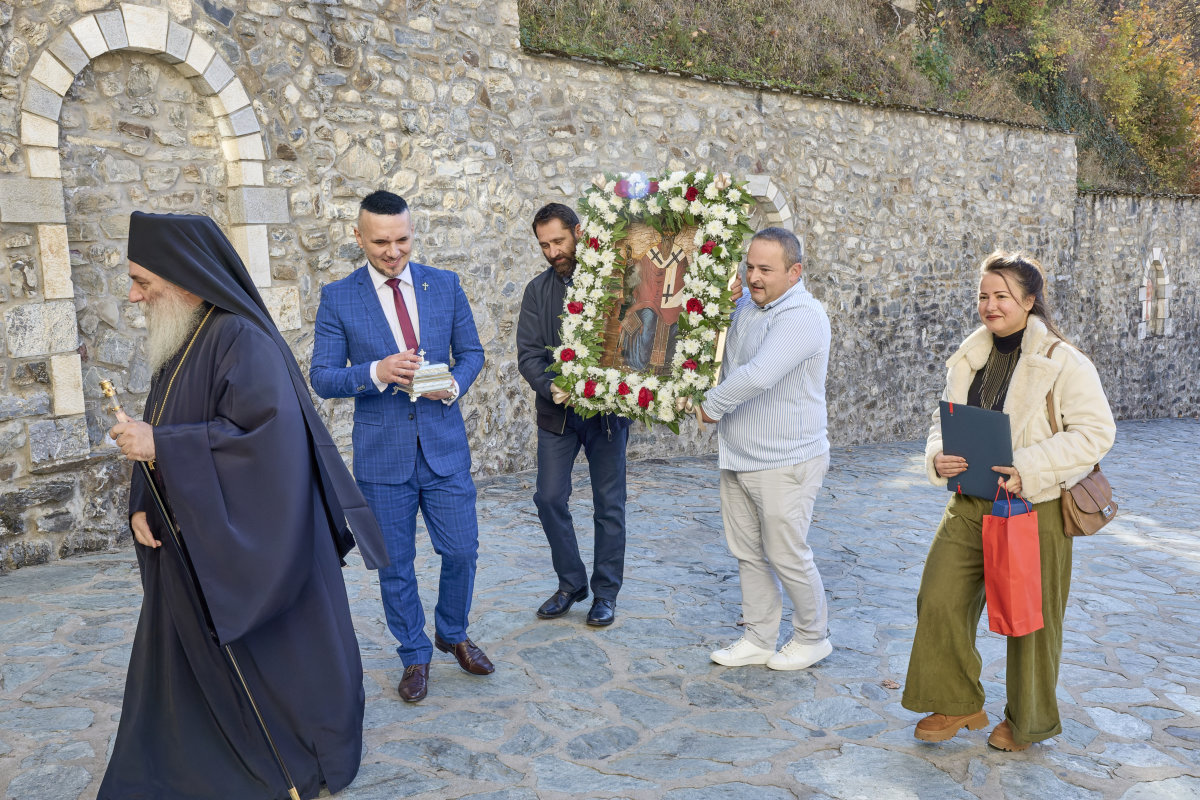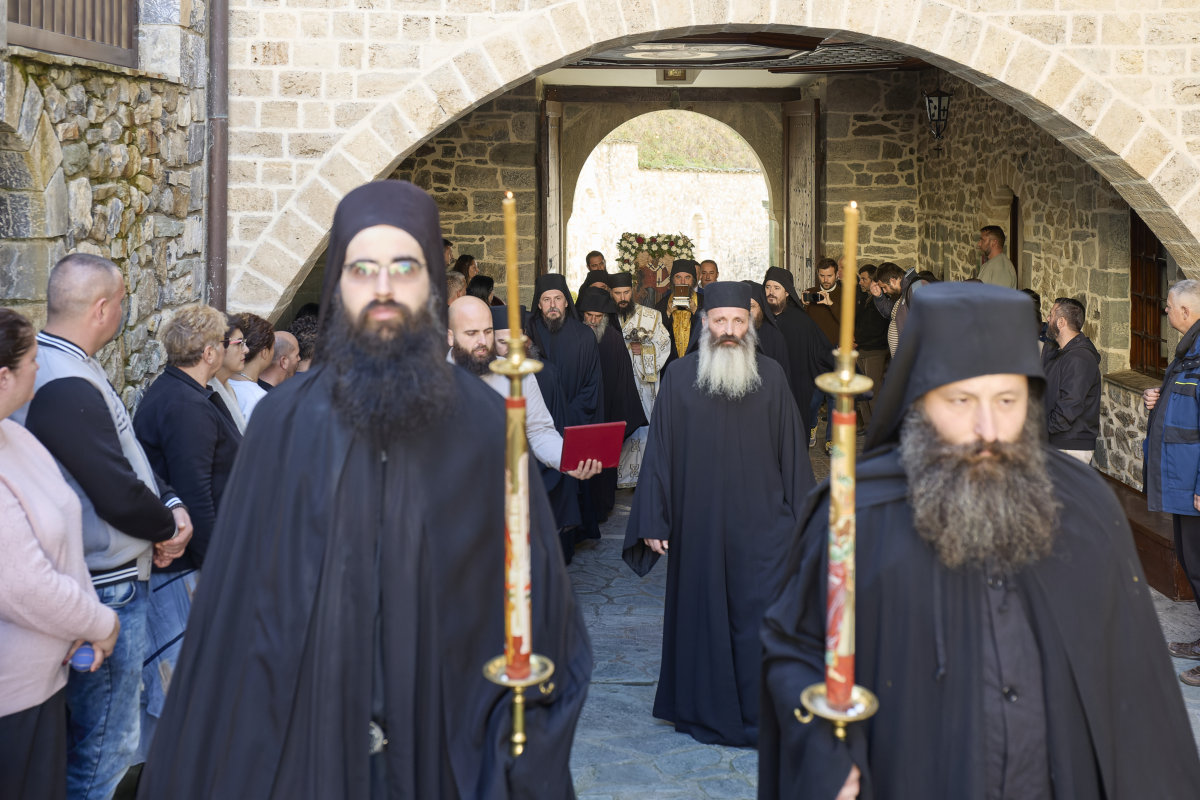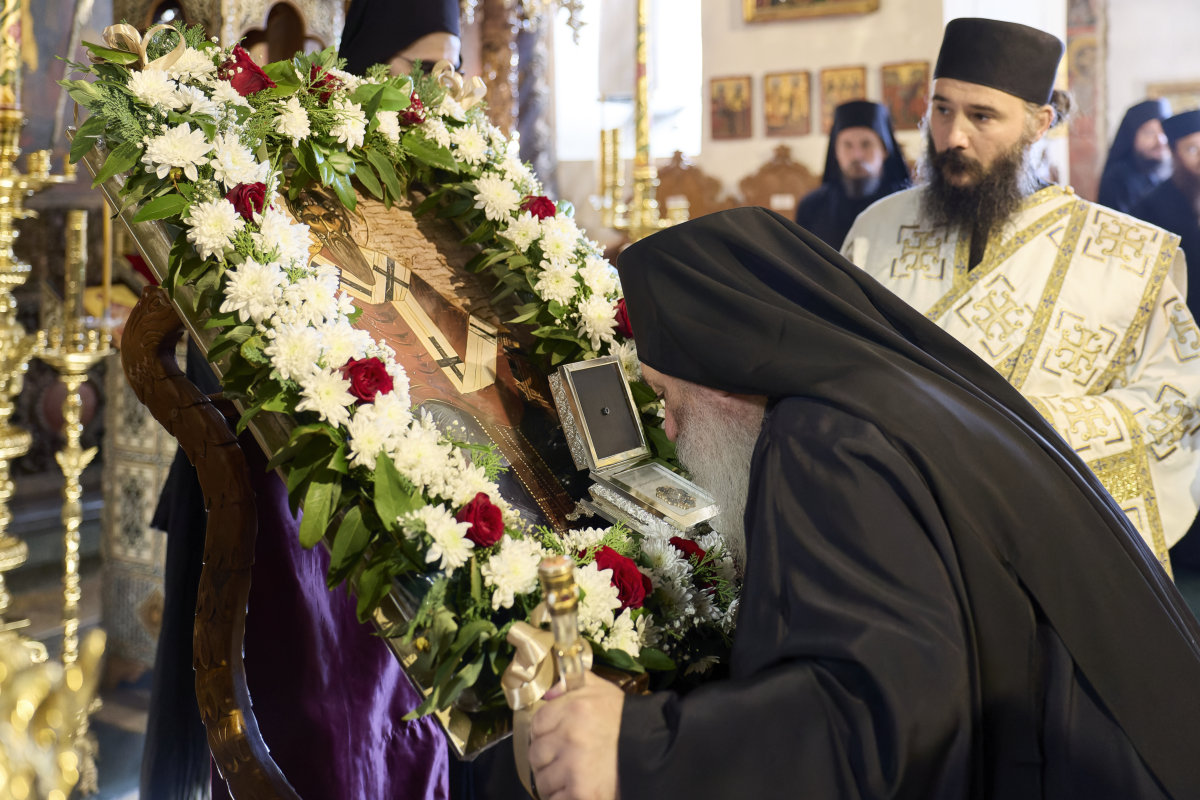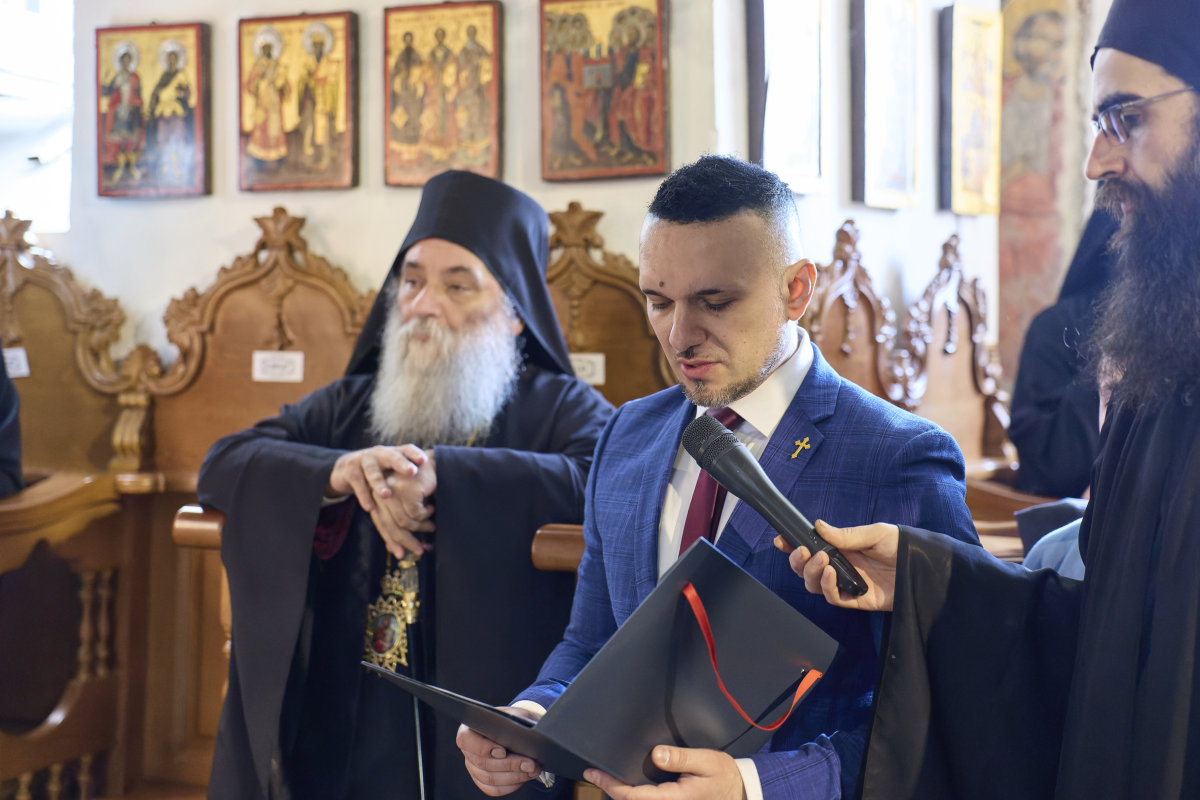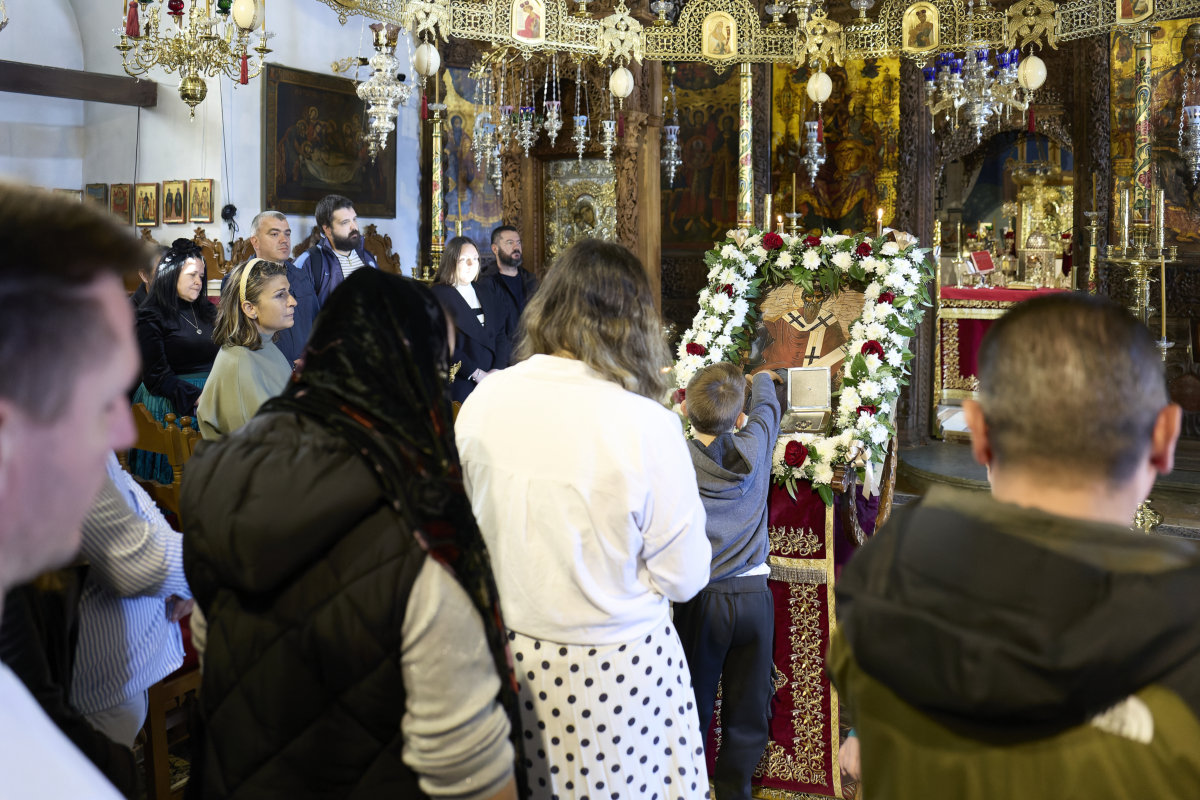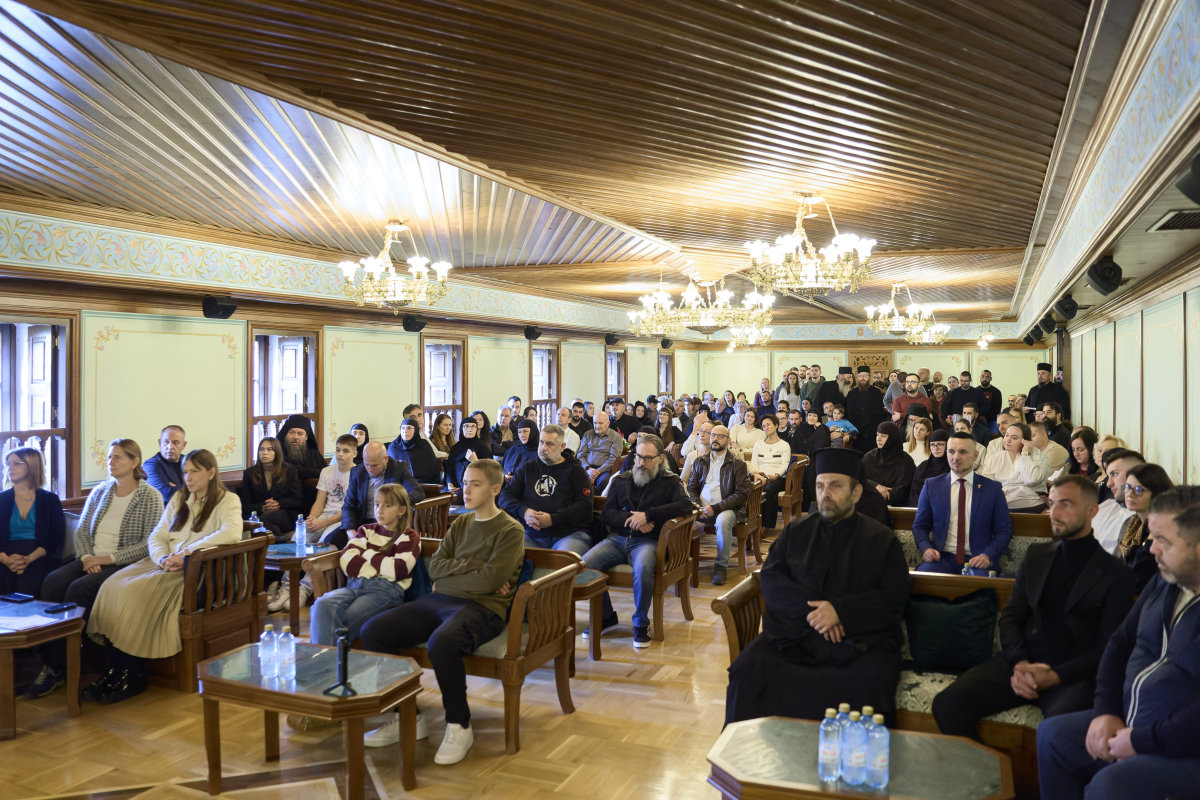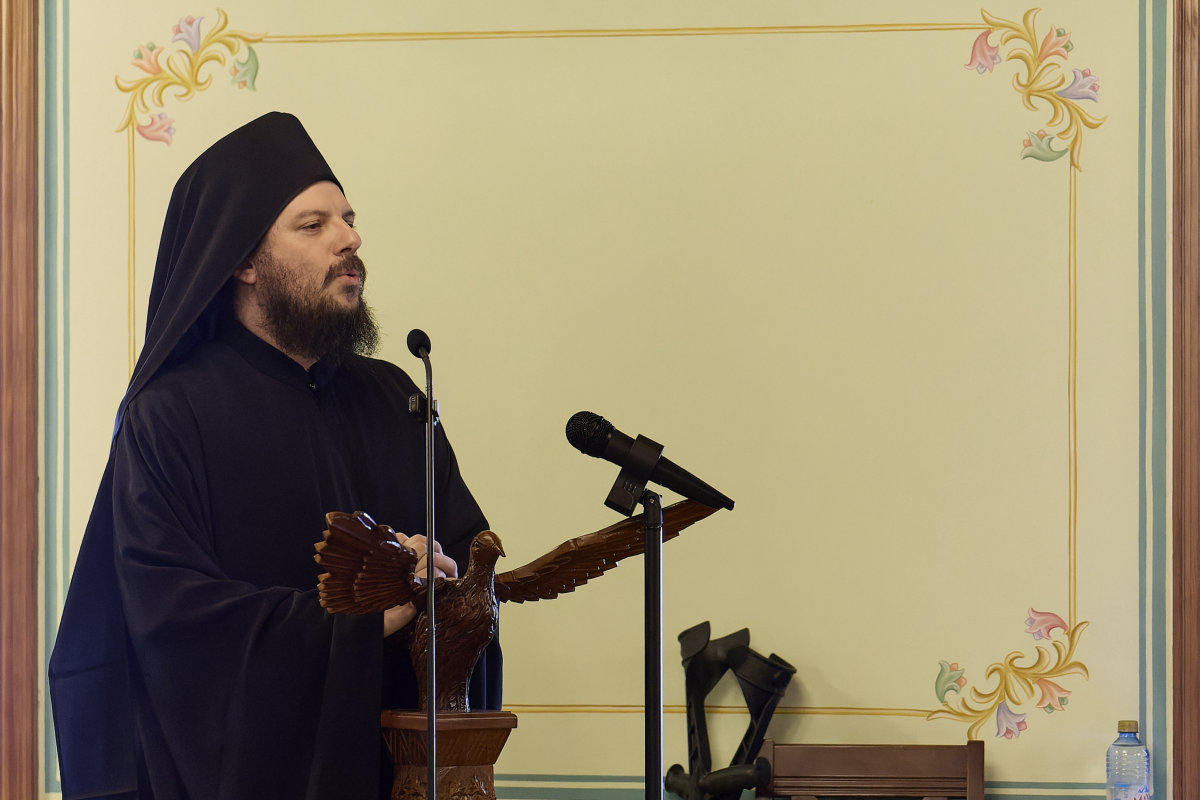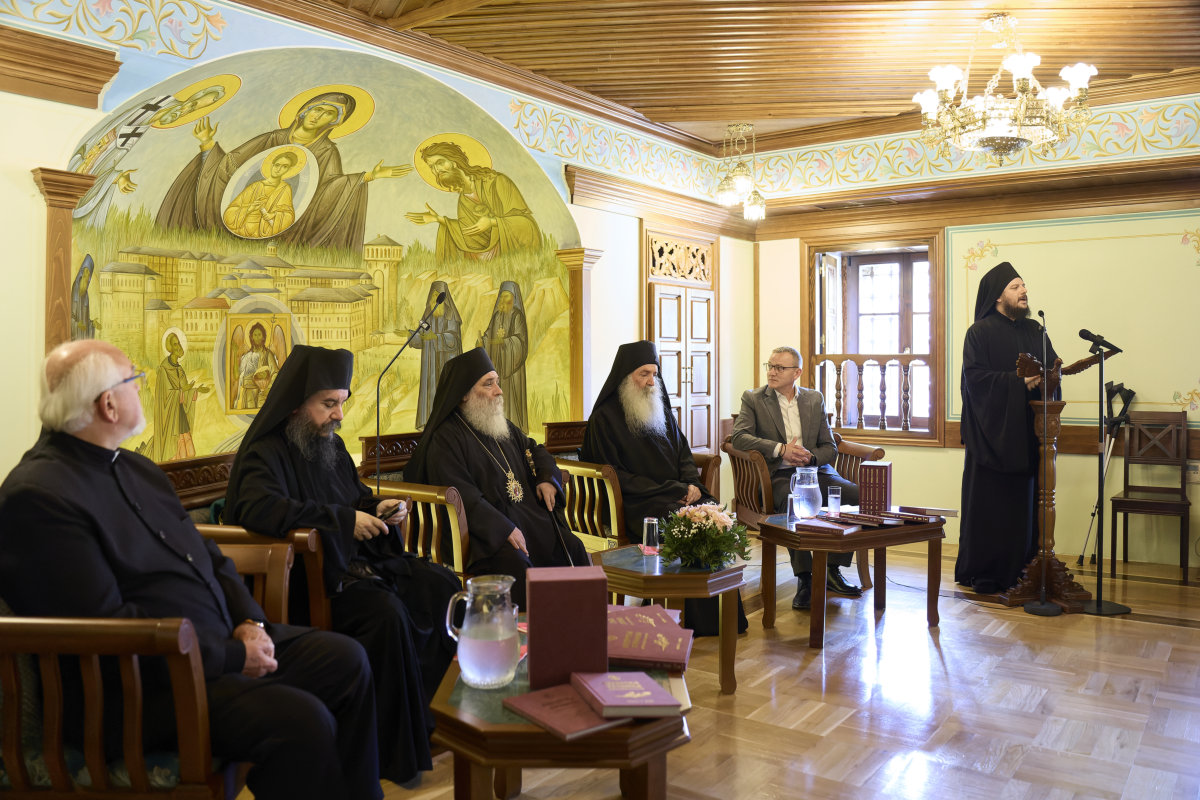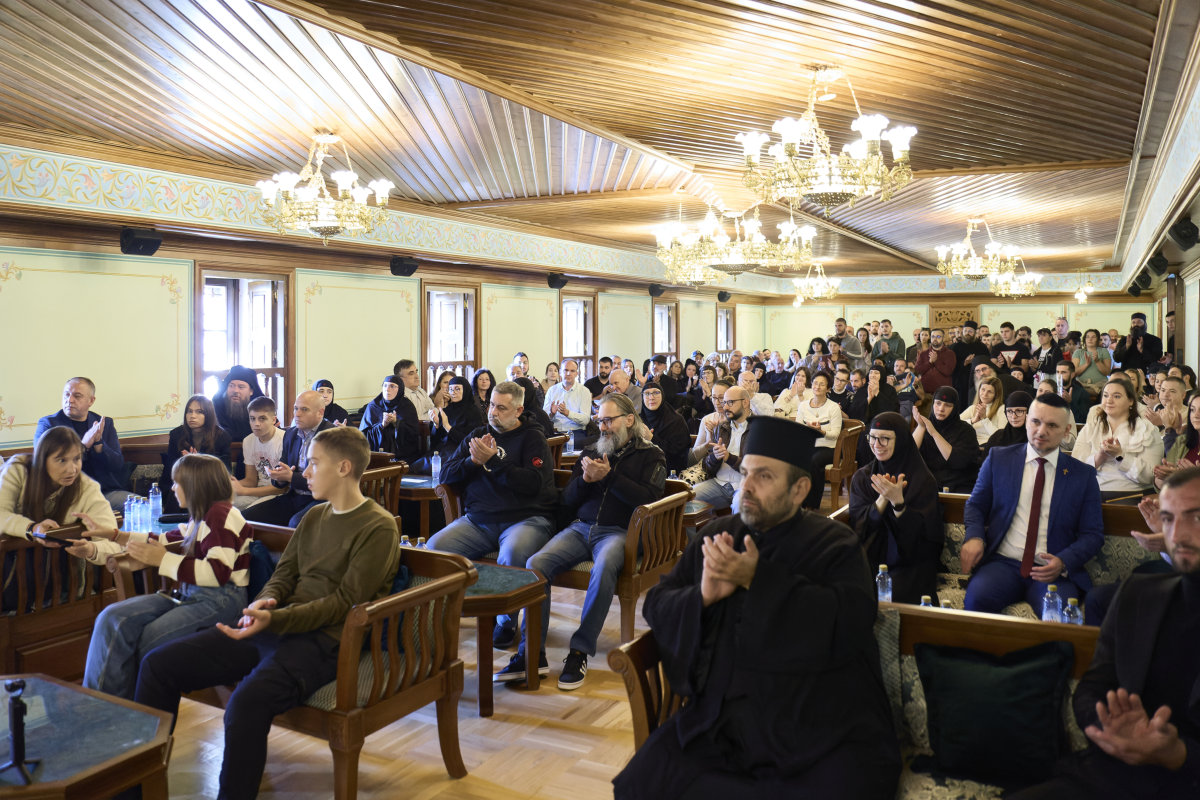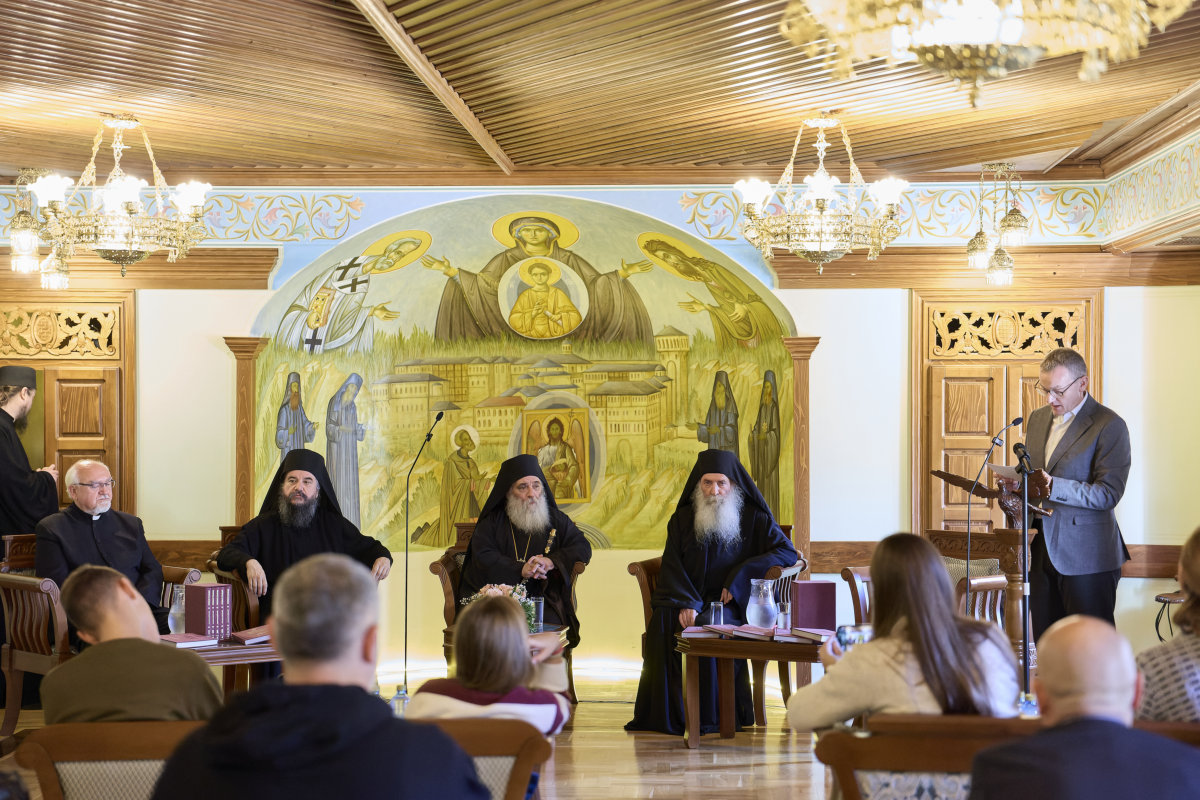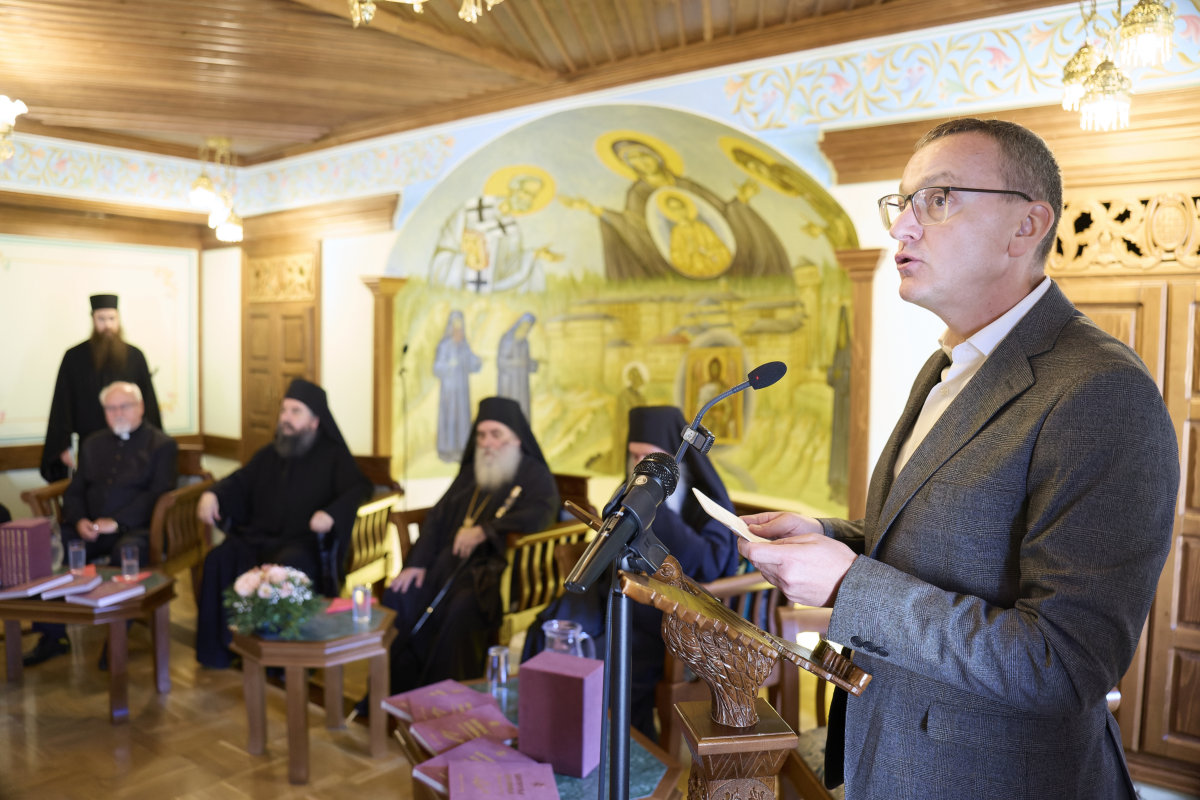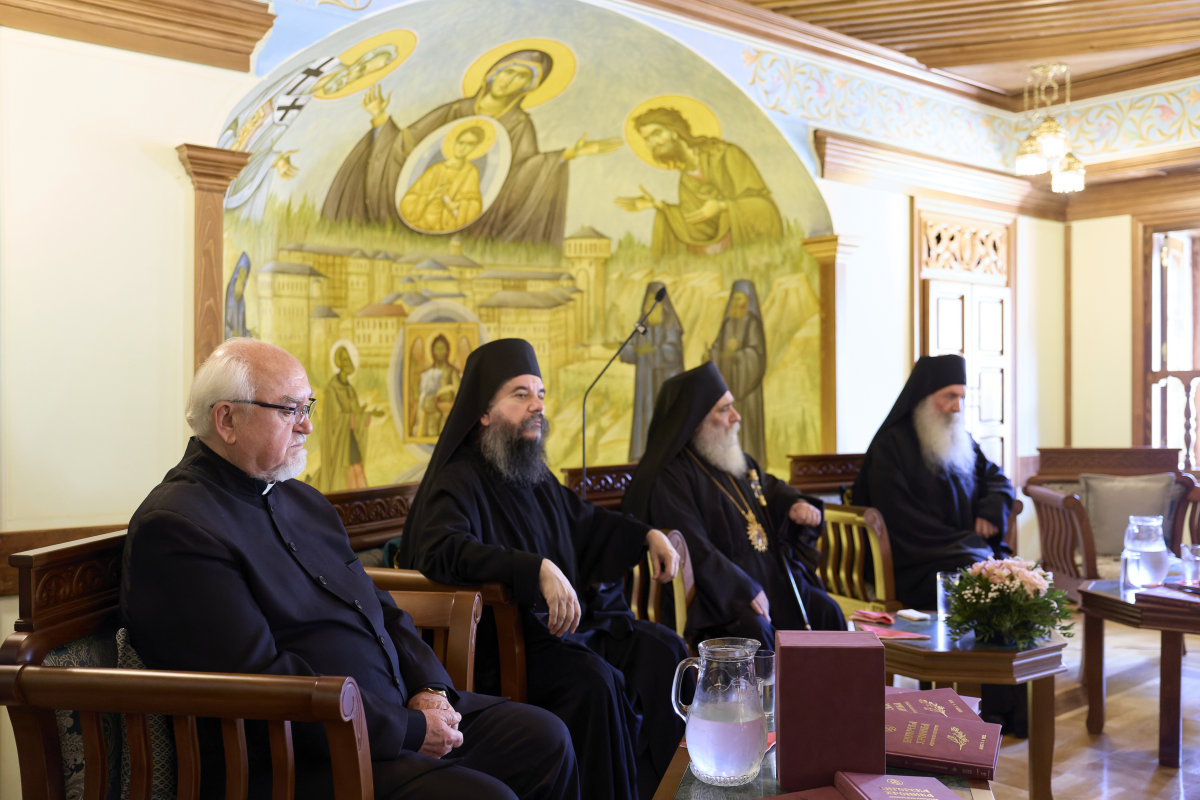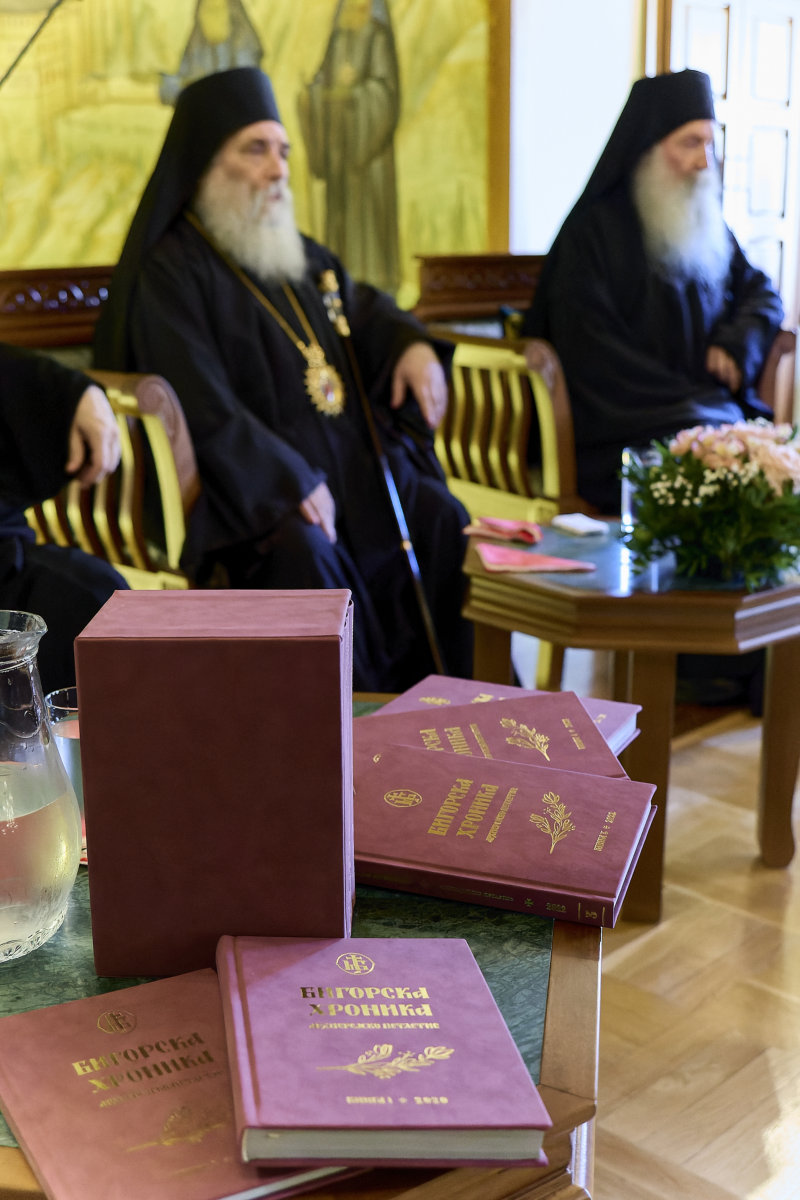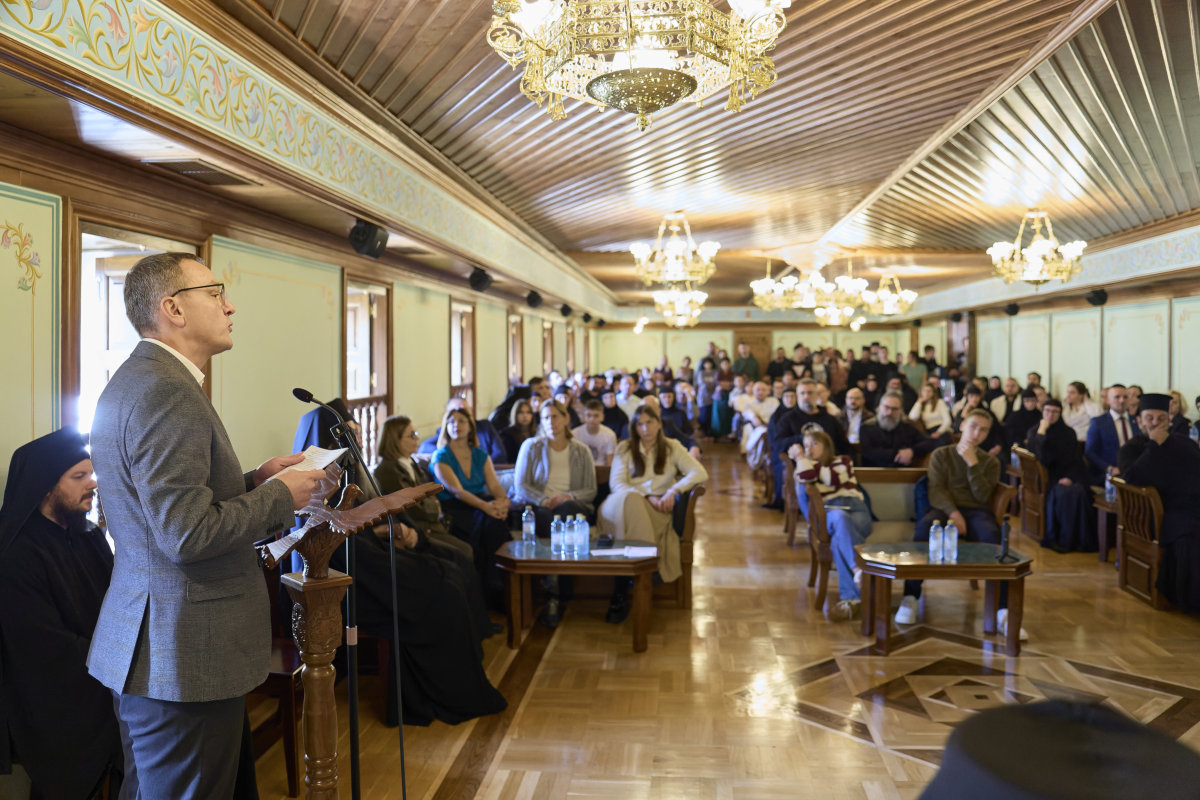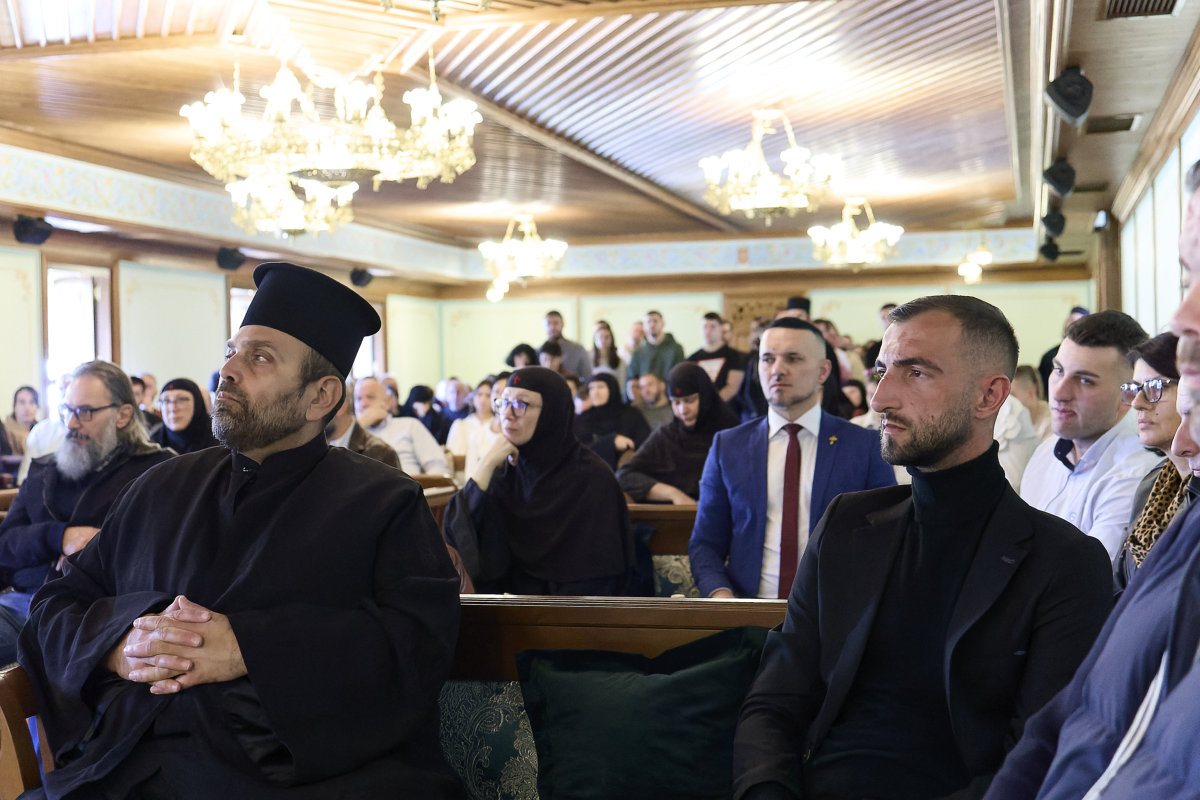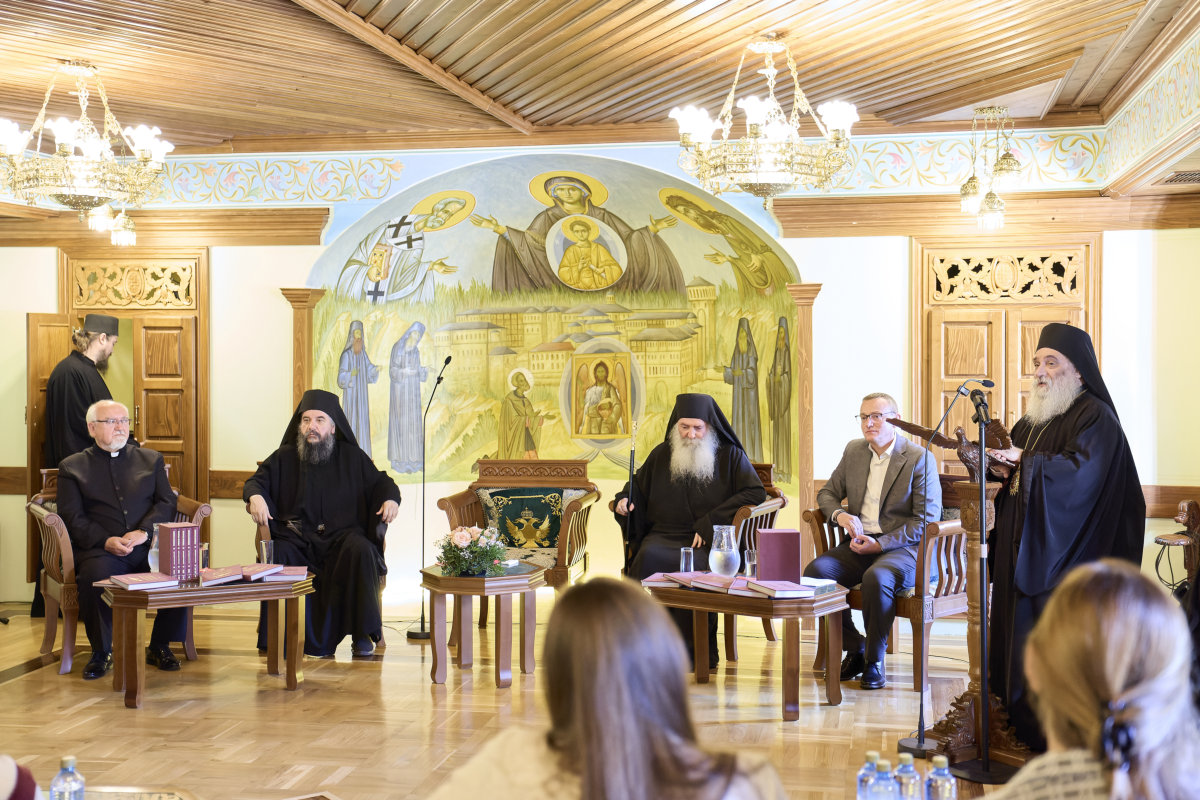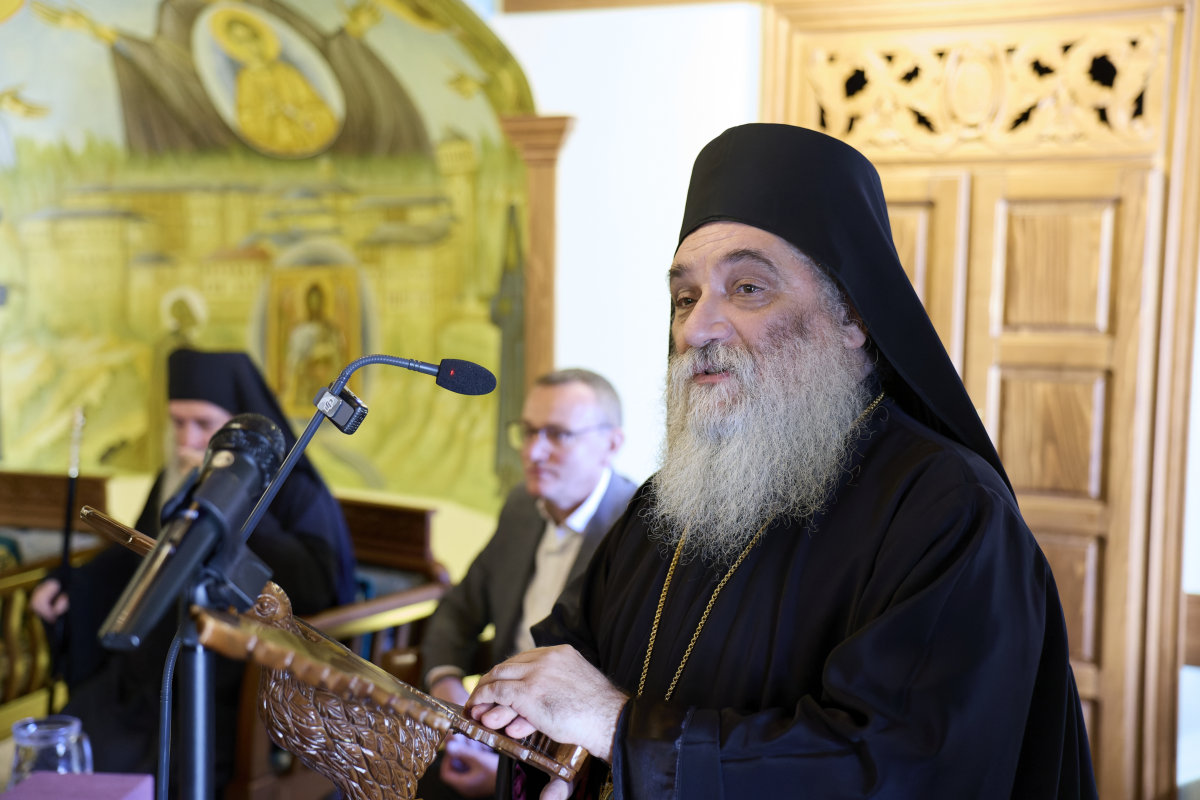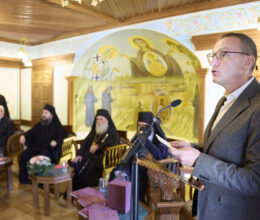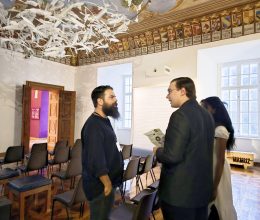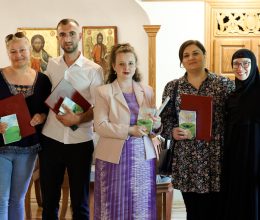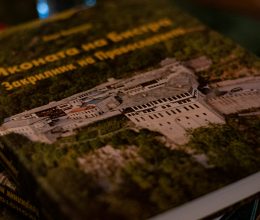The ancient Bigorski Holy Monastery, where the centuries have left indelible traces of the prayerful struggles of countless monks, today once again became the witness of an exalted spiritual gathering, one that united heaven and earth in a single prayer, a single thanksgiving, and a single doxology.
Bathed in resurrectional light, the day began with the grace-filled celebration of the Divine Eucharist in the Cathedral Church of the Honorable Forerunner. In an atmosphere of prayerful peace and heartfelt praise, the brotherhood and the multitude of faithful who had gathered offered thanksgiving to the Lord of Glory for all His ineffable mercies.
And behold, this blessed day was blessed even further by a special heavenly visitation. After the conclusion of the Divine Liturgy, with reverence and honor, the faithful received the holy relics of Saint Clement, Bishop of Rome—that apostolic man who sealed the faith of Christ with his martyrdom in the first century of Christianity. This sacred treasure was brought by our esteemed friend, the pious Mr. Aleksandar Mladenovski from the Australian–Sydney Diocese, originally from noble Bitola. With great love and fervent prayer, he obtained this holy relic from the Russian Orthodox Church Outside Russia in Australia, and, with the blessing of His Eminence Archbishop Georgij, presented it to our Elder and Abbot, His Grace Bishop Partenij of Antania, recognizing in his life and work a radiant example of living apostleship and unceasing love for the saints of God.
How wondrous are the dispensations of Divine Providence! Saint Clement, whose relics the holy brothers Cyril and Methodius once discovered in the depths of the sea near Cherson and carried reverently to Rome, now comes as a heavenly blessing to our Holy Monastery. Thus, through the ages, stretches the invisible thread of divine grace that unites the saints in one unbroken continuum, one eternal brotherhood in Christ.

After this magnificent moment, the solemn presentation of the newest literary publication of our Monastery took place in the ceremonial Synodikon Hall — the five-volume work “Bigorska Chronicle – Archpastoral Quinquennium”, a chronicle of the spiritual life of our monastic community and of the grace-filled ministry of our beloved Elder.
The celebration was graced by the presence of numerous distinguished guests: Her Excellency Mrs. Sofia Filippidou, Ambassador of the Hellenic Republic; the renowned professor from the Faculty of Theology in Skopje, Proto-Deacon Prof. Dr. Ratomir Grozdanovski, who is also the author of the beautiful and inspired prologue of this jubilee edition; Hieromonk Luke from the Athonite Monastery of Xenophontos; clergymen, professors, journalists, men of letters, public figures, and a great number of faithful.
On behalf of the brotherhood, the guests were first greeted by our confrere Archimandrite Kiril, editor of the publication, who in his brief address, marked by humility and love, emphasized that this work represents a thanksgiving offering from the Brotherhood to their spiritual father and renewer of monasticism, His Grace Bishop Partenij of Antania, on the occasion of three significant jubilees celebrated this year: 55 years since his birth, 30 years of monastic life, and five years of episcopal service.
Following this, the promoter of the work, the distinguished university professor Dr. Aleksandar Spasenovski, delivered an especially powerful and moving address, noting that this chronicle is not a mere record of passing events but a spiritual narrative of the transformation of human souls through the love of Christ, which pours forth through the work and spiritual labors of our Elder.
Afterwards, with touching words of fatherly gratitude, the Elder himself addressed those present, sharing his quiet joy and deep thanksgiving to the Giver of all good things, God, and to all who labored in the creation of this spiritual and literary work.
Beloved Prof. Dr. Ratomir Grozdanoski,
Beloved Prof. Dr. Aleksandar Spasenovski,
Honorable Ambassador of the Hellenic Republic, Mrs. Sofia Filippidou,
Reverend Fathers, venerable monks and nuns, beloved brothers, sisters, and children in Christ,
While listening to the address of Father Kiril, and especially to the promotional word of the esteemed Professor of Law, Aleksandar Spasenovski, who now also serves as advisor to Prime Minister Hristijan Mickoski, tears welled up in my heart. Not from sentimentality, nor from a passing emotion, but from gratitude, because the words they spoke were not mere formality, but a living testimony.
Professor Aleksandar, my long-standing spiritual child, whom I have known since his youth, did not speak as a guest, but as one who for years has been coming here, who knows the spirit of this brotherhood, who lives together with us, who feels this brotherhood as his own, who partakes in the liturgical life of the monastery, and who, together with his family, lives a truly ecclesial life. That is why, when we were considering to whom to entrust the word at this presentation, we decided that he was indeed the most fitting person. Because he could, with a pure heart and sincere conscience, bear witness to that which is being built here—not with hands, but first and foremost with prayers, love, and tears.
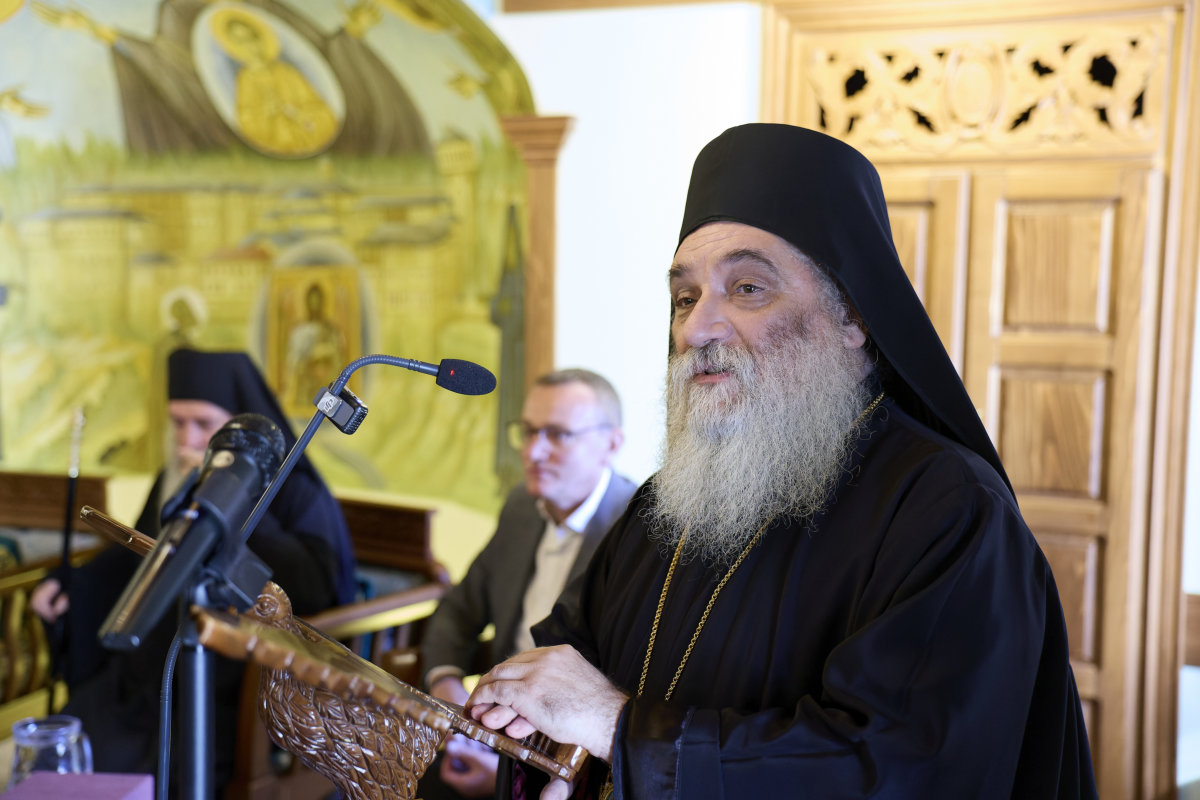
The foreword to the book, on the other hand, was written by our dear Professor Ratomir Grozdanoski—a long-time and renowned professor of the New Testament at the Faculty of Theology in Skopje, a man of deep spiritual insight, who has always been for me an example of quiet erudition and Christ-bearing wisdom. He was my class teacher in the secondary theological school in Dračevo. With him, then, I share more than thirty-five years of acquaintance, friendship, and spiritual closeness. He knows our beginnings, our growth, our longings and hopes. And so, when we received his foreword in our hands, after reading it with trembling, I said to Father Kiril: “This is not a foreword. This is a testimony.” And so we titled it: “A Testimony Instead of a Prologue.”
In those few pages, the professor does not write as a critic or as a theologian analyzing, but as a spiritual witness, who perceives the hand of God in the history of this holy place.
Professor Aleksandar spoke of many great things. As for me, I can only thank the All-Holy God Who has deemed us worthy to experience the wondrous manifestations of His mercy. That which we once merely desired and even dreamed of—to revive the cenobitic monastic life in our homeland—is today a reality. Believe me, this has always been my deepest desire, yet I never wished to be the one to found a monastery, nor to be an abbot or elder. That was something I truly never envisioned for myself. But as the Scripture says: “My thoughts are not your thoughts, neither are your ways My ways,” saith the Lord.[1] Thus, it was His will that led me here, to this Holy Monastery. I surrendered myself entirely to His guidance, and the Lord was the One Who arranged all things. Often, in the stillness of the night, I ask myself like the Apostle Paul, who with deep humility said: “Last of all, He appeared also to me, as to one untimely born.”[2] I can say that with all truth and with full awareness of my own unworthiness. Why, O Lord, did You accomplish all these things through me, when there were many better, wiser, and richer in gifts and virtues? Yet only He knows why He called my heart to bring forth these works that we see today—works that are truly great, not because they are ours and human, but because they are His.
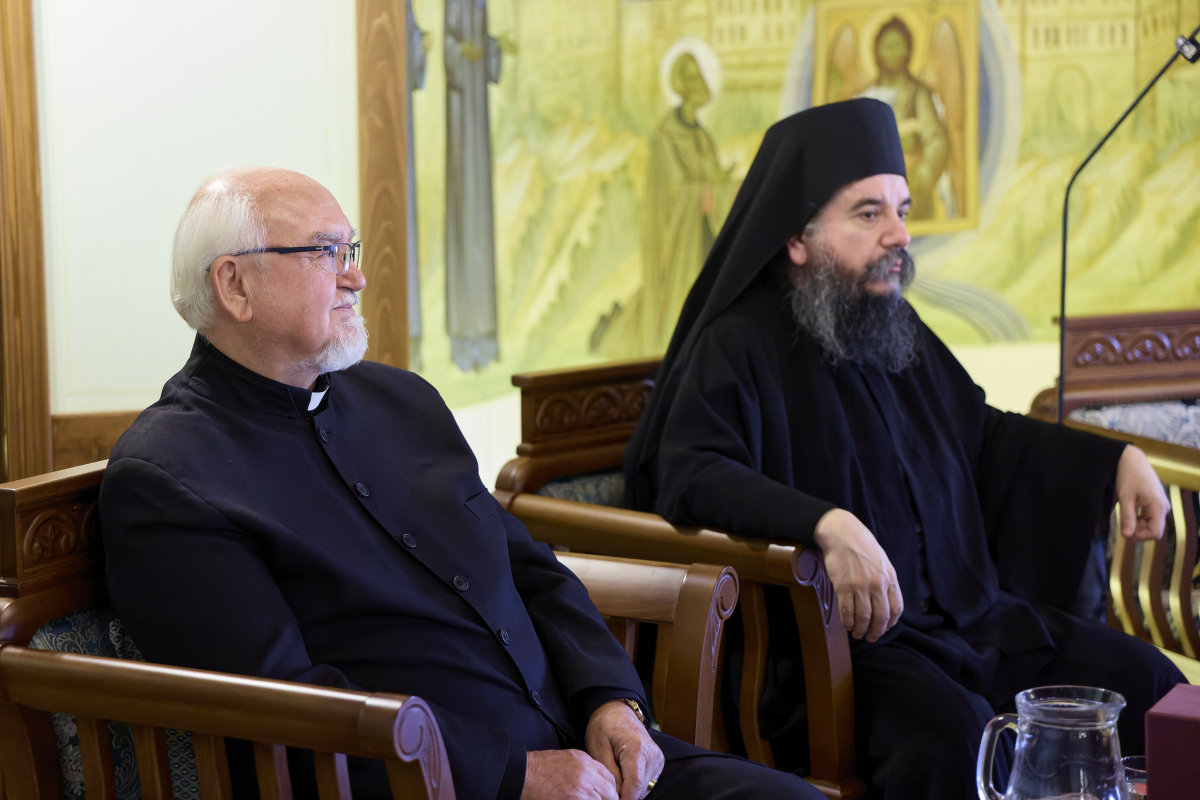
I feel utterly unworthy, and yet infinitely grateful. We thank God that He has granted us to inscribe a chapter in the history of our monasticism that bears witness to the living activity of the Holy Spirit in the Church. I often repeat, and I will say it again now: not we, but the monastic order to which we belong, is God’s planting in the history of the Church. Through it, the Lord continually renews faith, rekindles the spirit, and preserves the unity of the Church. Throughout the centuries, monasticism has been a silent yet steadfast pillar of Orthodoxy. I remember the days at the Seminary, under the guidance of our dear Professor Ratomir Grozdanoski—a man of luminous and gentle spirit—who not only taught us with words but also bore witness to the faith with his own life. Then we read and heard about monasticism, about its meaning and power, but we could not fully understand it. Everything remained a mystery until I beheld with my own eyes the life on the Holy Mountain and felt in my heart the grace of the monastic struggle. Only then did I comprehend how much monasticism can do for God’s people, how it can transform souls and restore life and spirit to the Church. For monasticism is closest to the heart of the people. It does not rule, but serves; it does not teach with words, but with silent presence. And precisely through the monastic brotherhoods, the liturgical life in our Church was renewed, spirituality revived, and love for God rekindled.
A few days ago, the inhabitants of Reka and Debar—most of whom have moved here precisely because of the monastery and monasticism—wished to surprise me on the occasion of my birthday. Each of them had written a short and heartfelt message expressing how they perceive the monastery, and all were filled with much love and gratitude. Yet among all those messages, one touched me most deeply. A small child from the village of Bitushe wrote the shortest, and perhaps the greatest, message: “I thank God that I met You, so that through You I could come to know Him.” Those words moved me to tears. Behold, that is our imperative. That is the essence of monastic life: to bear witness of Christ to the souls of men, so that through us people may recognize Him. For that have we lived until this day. That is the meaning of our existence—to reveal Christ in our countenance, in our deeds, in our peace and love. I hope that, at least in part, we have succeeded in this. Personally, I do not feel that I have succeeded, but I know that my brethren have, because their love, their obedience, and their faith have moved the Lord to bless all that we see today. All those faithful who have been coming here for years, who love this holy place, are witnesses that the Lord bestows His mercy upon this monastery not because of us, but because of their faith and purity of heart. Yet precisely because of that, seeing such love, I feel how great is the responsibility that we bear—to preserve the spiritual authority that has been attained thus far, to guard the spirit of sacrifice and love that is the hallmark of this brotherhood.
These words I address above all to my brother monks: to stand upright, to stand firm in Christ, in faith, in love, and in obedience. Let not the heart waver in hardship, nor the mind in temptation, so that we may worthily complete the path upon which we have all vowed to walk. For, as the Lord says: “He who endures to the end shall be saved.”[3]
Once again, I thank you for your presence, for your prayers, and for your love. May God grant that we all remain faithful witnesses of Christ, Whom we love and Whom we serve—unto the ages. Amen.
At the conclusion of the presentation, the young angelic voices of the choir “Metropolitan Kozma of Prečista” from Kičevo filled the entire space with the fragrance of monastic chant, instilling tender compunction and spiritual joy in the hearts of all those present.
Thus, this day was sealed as a radiant and blessed feast of the Word and of the Spirit. It was not a mere literary presentation, but a harmonious symphony of thanksgiving and love, a testimony that wherever the word unites with prayer, there Christ reveals Himself as living—in deeds, in hearts, and in the prayerful silence of everyone who loves Him.
Once again, the Bigorski Holy Monastery revealed itself as a center of grace and light, of spirituality and culture, a witness to the presence of God in our time.
[1] Isaiah 55:8
[2] 1 Corinthians 15:8
[3] Matthew 24:13
